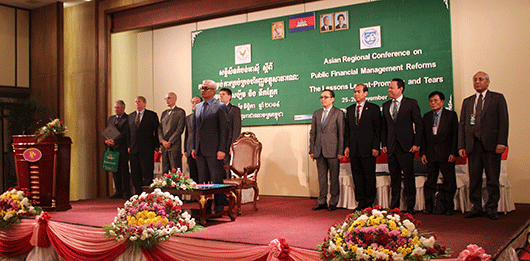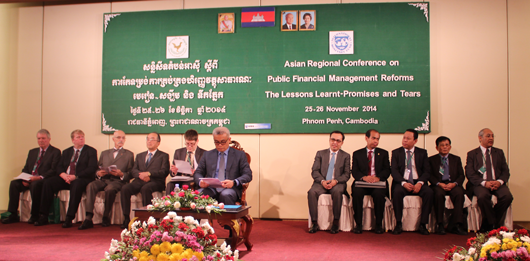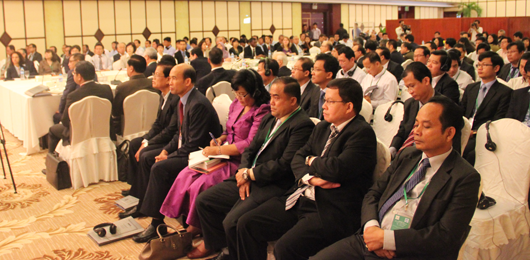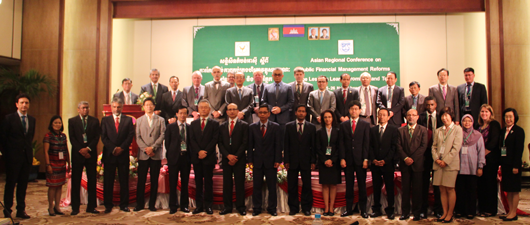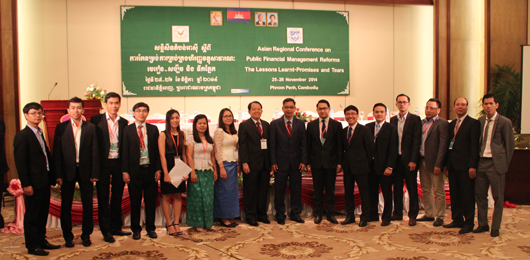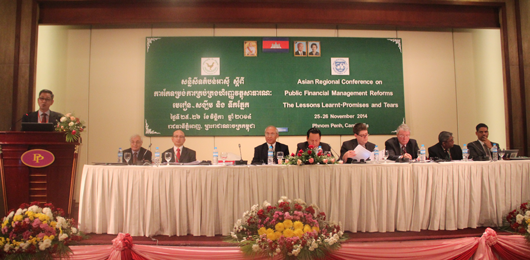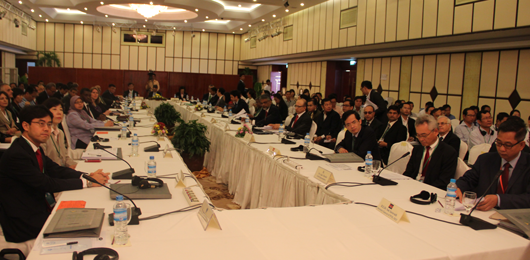សន្និសីទអន្តរជាតិ

Date: 25-26 November 2014
Opening Remarks
By
H.E Dr. Aun Pornmoniroth
Minister of Economy and Finance
At the
Asian Regional Conference on Public Financial Management:
“The Lessons-Learnt- Promise and Tears”
on 25-26 November 2014
- H.E. Yuji Kumamaru, Ambassador of Japan
- H.E. Gerd Schwartz, Deputy Director, Fiscal Affairs Department, IMF
- Excellencies, Colleagues, Ladies and Gentlemen!
First of all, let me welcome all of you to Cambodia and to the Asian Regional Conference on Public Financial Management. I am glad and delighted to host this important event in Cambodia and would like to thank all of you, especially the IMF for agreeing to jointly organize this Conference, for sparing your valuable time to be in Phnom Penh in order to share our experience in this important area and issues of the reform as set out in the two days agenda with the theme defined as The Lessons Learnt- Promise and Tears.
This two days Conference is a great opportunity to share and learn from each other on the general public financial management reform strategies as well as some specific reform topics such as performance management and budgeting reforms, modernizing budget execution, fiscal decentralization, and public enterprise reforms. In addition, I am glad to see the Conference will also discuss the public financial management system measuring tool, the Public Expenditure and Financial Accountability (PEFA), as we are now initiating a repeat PEFA assessment. Moreover, this Conference will also provide inputs to the process of shaping strategic direction of our public financial management reform program and developing of our reform action plan for the next platform and stage.
I am also glad to note that this Conference will also discuss issues relating to budget execution for this is an area where it is important to strike a right balance between control and flexibility so that service delivery units can perform, without undue constraints. This applies equally to fiscal decentralization issues where, while it is important to delegate and de-concentrate to other levels of Government, it is equally important to ensure that the overall management of resources is not vitiated. Another important area of public financial management, especially in several developing countries is public enterprises. While they perform important and essential services in several areas, it is natural sometimes for them, to lose the focus on costs and efficiency. I am happy that this Conference will discuss ways to develop new policy and monitoring frameworks for them so that the burden on the State can perhaps be lessened and efficiency improved.
In about ten years Cambodia has made tremendous strides in reforming its public financial management, but much more remains to be done. We have pioneered the “Platform Approach” which has enabled our public financial management system to reforms itself in a more comprehensive way. We started with the successful budget credibility in platform 1 when our focus was in year smoothing revenue collection and cash release, then we moved on to a rather more complex financial accountability of platform 2 in early 2009 in which our focus is to improve financial accounting including recording and reporting with the financial management information system to be installed next year. We are planning to complete platform 2 sometimes in 2016 when platform 3, budget-policy linkages, can fully started and completed by no later than 2020 when platform 4; performance accountability can be fully started and completed by 2025 to conclude the overall reform program.
Excellencies, Colleagues, Ladies and Gentlemen!
The Royal Government of Cambodia has made a commitment to reforming its public financial management system towards achieving international standards, that is, “to gradually change from an input based and centralized system to a result based and decentralized system” through a long-term comprehensive public financial management reform program, a four-platform and four-stage strategies, a step by step approach which also known as platform approach, including (1) Increasing budget credibility, (2) Increasing Financial Accountability, (3) Linking the budget to policy and (4) Increasing performance Accountability.
The successful implementation of platform one in 2008 when fundamental principle system and administration improvement have been introduced, substantial budget credibility increased and reflected in the improvement of revenue collection; budget release and cash management. As a result, the predictability and control in budget execution have improved due to the elimination of chronic cash shortage and arrears, the smoother in year budget expenditure, and the substantial increase in revenue collection. Moreover, we were able to overcome the global financial and economic crisis during 2009 to 2011 due to the increase of government reserve that was accumulated from 2004 to 2008.
We are now in a very critical juncture of platform two where we are about to install some new features, such as new chart of accounts, new budget classification, new business process, into our current system together with the financial management information system (FMIS) application. The new system and application, of course, requires new skills and new way of doing business and management. And we have gone through lots of difficulties and challenges in preparing for these new features and application to be able to inject into our current system; however we are now confident that we will be ready to launch our first phase of FMIS in 2015.This will mark another step of success in raising our public financial management system towards international standards especially in terms of improve quality and timely of accounting records and reports which are the keys for increasing transparency and accountability and as well as for better budget and policy analysis that are the focus of our next platform, platform three.
In addition, another new features to improve the linkages between policy and budget especially as a step to increase allocative efficiency we also prepared and introduced as a pilot, that are budget strategy plan, program budgeting, and budget entity. Budget strategy plan and program budgeting were piloted since 2008 as the first phase of budget system reform and we are moving into the second phase next year when full program budgeting and budget entity pilot will be introduced in 10 Line Ministries. We also developed “a concept on the strategic direction for budget system reform in Cambodia for 2013-2020” to set out a clear direction and as well as to ensure coherent and consistent with the overall public financial management reform program goals and with other key reform programs such as public administrative and subnational reform programs which are also implementing in Cambodia.
Excellencies, Ladies and Gentlemen!
By 2025, it is expected that Cambodia will have a modern public financial management system that promotes effective and efficient use of scarce public resources and enables government to improve the delivery of basic public services. I must thank all our development partners who have helped us during the ongoing PFM Reform Program which will help us established a credible budget process that is policy-based and supported by strong financial accountability system that holds organizations accountable for performance. It is also expected that by then, the system will have the capacity to allocate resources in line with the government’s policy priorities, capture all public revenues and spending in a transparent way regardless of its source, and monitor agency performance in achieving defined outcomes as it reviews adherence to financial rules and regulations.
In this endeavor it is important not merely to learn from the success stories that abound but also from the lack of success in some areas. Indeed it is clear that sometimes, when broad ranging reforms are attempted, contextually incorrect decisions are bound to be made. The wise man does not ignore his errors but learns from them so that the right lessons are learnt and performance improved. Each solution is neither right nor wrong in a pure sense- it is a factor of time and space. The solutions that suit one country may not be appropriate for another. In the same way similarly solutions that were appropriate at one point of time may no longer be suitable at another time. I am also glad that this Conference emphasizes the fact that the success of some reforms initially promised did not fructify and the focus of the discussions would be to examine the reasons for success or failure and draw from the vast amount of country experience gathered around this room today. This august gathering, representing a tremendous amount of public financial management experience, would be able to enlighten us with several examples where a well intentioned reform did not work the way it was originally envisaged. That, to me, presents a great opportunity to identify alternate solutions that would have been more viable, and indeed, we hope to learn from that wisdom and improve our own reform process as we move to the next stage of PFM reform in Cambodia.
Excellencies, Ladies and Gentlemen!
2015 will be our reform transition year when platform two will be completed and platform three will be started in early 2016, though some further improvement of financial accountability will be continue. We are now initiating a repeat PEFA assessment in which our plan is not only to get further inputs into the development of our next platform action plan but also to make this an exercise where we can simultaneously build our internal capacity. Therefore, with the assistant of IMF regional adviser, our staff is doing an initial assessment which would then be followed up by a review of the initial report by international experts and our Development Partners to ensure credibility of the initial effort.
We are aware that the process of public financial management reform is not simply one of identifying certain areas and improving upon them. The process involves the examination of various information sources, identification of bottlenecks which could range from the legal to human resource issues, and most importantly, what is now being finally identified as the “soft side” of PFM reforms. These “soft” issues may appear, to many technical experts as nebulous areas to focus upon, but in reality these are what make or break a reform process. We feel that it is important to focus on them and not be driven merely by the desire to emulate the reforms in more advanced countries. Instead it is important to recognize our constraints and plan to overcome them in a systematic manner while ensuring that the human side of the reform process is not ignored. We hope to learn from all of you on how we should best plan the next steps of our own reform process.
I look forward to the deliberations and the critical analysis of the public financial management systems across a wide range of experience that all of you represent and how it can help us in our own reform process. I do hope, you will also have time to absorb our ancient history and culture while you are here and spend some time outside Phnom Penh as well.
Finally, I would like to thank Excellencies, Colleagues, Ladies and Gentlemen, for being here with us today. A special thank go to the IMF for co-hosting this Regional Conference with the Royal Government of Cambodia.
I wish for a productive and fruitful Conference.
Thank You
Press Conference
សន្និសីទសារព័ត៌មានស្តីពី
សន្និសីទតំបន់អាស៊ីស្តីពីការគ្រប់គ្រងហិរញ្ញវត្ថុសាធារណៈ
ក្រោមមូលបទៈ ការកែទម្រង់ការគ្រប់គ្រងហិរញ្ញវត្ថុសាធារណៈ៖ មេរៀន - សង្ឃឹម និង ទឹកភ្នែក
១- ក្រសួងសេដ្ឋកិច្ចនិងហិរញ្ញវត្ថុកម្ពុជា និងមូលនិធិរូបិយវត្ថុអន្តរជាតិ (IMF) បានរួមគ្នារៀបចំសន្និសីទតំបន់អាស៊ីអំពីការគ្រប់គ្រងហិរញ្ញវត្ថុសាធារណៈក្រោមមូលបទ “ការកែទម្រង់ការគ្រប់គ្រងហិរញ្ញវត្ថុសាធារណៈ៖ មេរៀន - សង្ឃឹម និង ទឹកភ្នែក នៅរាជធានីភ្នំពេញ សម្រាប់រយៈពេល២ ថ្ងៃ និងមានអ្នកចូលរួមជិត២០០ នាក់ មកពី២០ ប្រទេសនៅតំបន់អាស៊ី មកពីអង្គការអន្តរជាតិ និងមកពីគ្រប់ក្រសួងនៃរាជរដ្ឋាភិបាលកម្ពុជា។ គោលបំណងនៃសន្និសីទគឺ (១)ដើម្បីចែករំលែក និងដកស្រង់បទពិសោធន៍ពីគ្នាទៅវិញទៅមកលើការងារកែទម្រង់ការគ្រប់គ្រងហិរញ្ញវត្ថុសាធារណៈ ពិសេសស្វែងយល់អំពីបញ្ហាប្រឈម និងកត្តា ដែលអាចនាំទៅដល់បរាជ័យដែលគួរជៀសវាងរវាងបណ្តាប្រទេសអាស៊ី (២)ដើម្បីបង្កើតជា បណ្តាញទំនាក់ទំនងរវាងមន្ត្រីជំនាញជាន់ខ្ពស់ និងអ្នកជំនាញអន្តរជាតិក្នុងផ្នែកការគ្រប់គ្រងហិរញ្ញវត្ថុ សាធារណៈ ពិសេសការងារកែទម្រង់ក្នុងគោលដៅបង្កលក្ខណៈងាយស្រួល និងទាន់ពេលវេលាក្នុងការ ចែករំលែកបទពិសោធន៍ទៅវិញទៅមក និង (៣)ដើម្បីប្រមូលបានធាតុចូលបន្ថែមទៀតសម្រាប់ការរៀបចំសម្រួចទិសដៅយុទ្ធសាស្ត្រ និងផែនការសកម្មភាពដំណាក់កាលទី៣ នៃកម្មវិធីកែទម្រង់ការគ្រប់គ្រងហិរញ្ញវត្ថុសាធារណៈ ដែលបាន និងកំពុងត្រៀមរៀបចំក្នុងគោលដៅដាក់ឱ្យអនុវត្តនៅដើមឆ្នាំ ២០១៦ ខាងមុខ បន្ទាប់ពីបន្ទាប់ដំណាក់កាល២ នឹងត្រូវបានបញ្ចប់នៅដំណាច់ឆ្នាំ២០១៥។
២- ប្រធានបទសំខាន់ក្នុងការងារកែទម្រង់ការគ្រប់គ្រងហិរញ្ញវត្ថុសាធារណៈ ត្រូវបានលើកយកមកពិភាក្សាយ៉ាងផុសផុល យ៉ាងល្អិតល្អន់ និងប្រកបដោយផលិតភាព និងផ្លែផ្កា តាមរយៈការចាប់ផ្តើមពីការធ្វើបទបង្ហាញរបស់អ្នកជំនាញជាន់ខ្ពស់ និងដែលមានបទពិសោធន៍ បន្ទាប់មកមានការពិភាក្សា និងផ្តល់យោបល់ដោយក្រុមអ្នកជំនាញដែលមានបទពិសោធន៍ផ្សេងទៀត មុននឹងឈានដល់សំនួរចម្លើយនៃអង្គសន្និសីទទំាងមូល ហើយចុងក្រោយ គឺការបូកសរុបរបស់ប្រធានក្រុមពិភាក្សានៃវគ្គនីមួយៗ។ ប្រធានបទដ៏មានសារសំខាន់ចំនួន៦ ដែលត្រូវបានលើកយកមកពិភាក្សានៅក្នុងសន្និសីទរយៈពេល២ ថ្ងៃកន្លងទៅ នេះរួមមាន៖
(១) អភិក្រមជាជំហាននៃកំណែទម្រង់ៈ ផ្តោតការពិភាក្សាទៅលើយុទ្ធសាស្ត្រកែទម្រង់ដែលត្រឹមត្រូវ សមស្រប ស័ក្តិសិទ្ធ និងប្រសិទ្ធភាព ពិសេសពិភាក្សាដកពិសោធន៍អំពីកត្តាជោគជ័យ និងកត្តាបរាជ័យនៃការកែទម្រង់ការគ្រង់គ្រងហិរញ្ញវត្ថុ - អភិក្រមជាជំហាន, អភិក្រមដឹកមុខដោយមហិច្ឆតា ឬ ផ្តើមពី មូលដ្ឋានចាំបាច់មុន, អភិក្រមដឹកមុខដោយបច្ចេកវិទ្យាព័ត៌មាន (វាគ្មិនៈ កម្ពុជា និងមូលនិធិរូបិយវត្ថុអន្តរជាតិ)
(២) ការគ្រប់គ្រងសមិទ្ធកម្ម និងការកែទម្រង់ការរៀបចំថវិកាៈ ផ្តោតការពិភាក្សាទៅលើវិធីសាស្ត្រក្នុងការធ្វើការកែទម្រង់ទៅរកការគ្រប់គ្រងដោយសមិទ្ធកម្ម - លទ្ធផល ពិសេស ពិភាក្សាលើបទពិសោធន៍នៃបណ្តាប្រទេសដែលបាន និងកំពុងឆ្លងកាត់ - កត្តាជោគជ័យ និងកត្តាបរាជ័យជៀសវាង (វាគ្មិនៈ ឥណ្ឌា និងម៉ាឡេស៊ី)
(៣) ការធ្វើទំនើបកម្មការអនុវត្តថវិកាៈ ផ្តោតលើការពិភាក្សាទៅលើការកាត់បន្ថយការត្រួតពិនិត្យពីថ្នាក់កណ្តាល ដោយផ្តល់ភាពទន់ភ្លន់ដល់អង្គភាពផ្តល់សេវាសាធារណៈផ្ទាល់ និងការពង្រឹងការងារសវនកម្មផ្ទៃក្នុង (វាគ្មិនៈ មូលនិធិរូបិយវត្ថុអន្តរជាតិ ឥណ្ឌូនេស៊ី ជប៉ុន)
(៤) ឧបករណ៍វាយតម្លៃ និងការរួមចំណែករបស់វាក្នុងការកែទម្រង់ការគ្រប់គ្រងហិរញ្ញវត្ថុសាធារណៈ-ចំណាយសាធារណៈ និងគណនេយ្យភាពហិរញ្ញវត្ថុ (PEFA): ផ្តោតការពិភាក្សាទៅលើឧបករណ៍ និងយន្តការសម្រាប់វាយតម្លៃសុខភាពនៃប្រព័ន្ធគ្រប់គ្រងហិរញ្ញវត្ថុសាធារណៈ ពិសេសពិភាក្សាលើប្រសិទ្ធ- ភាព និងអត្ថប្រយោជន៍នៃការប្រើប្រាស់ឧបករណ៍ទំាងនេះសម្រាប់វាយតម្លៃ (វាគ្មិនៈ មូលនិធិរូបិយវត្ថុសាធារណៈ កម្ពុជា ម៉ាល់ឌីវស៍)
(៥) ការកែទម្រង់សហគ្រាសសាធារណៈ ផ្តោតការពិភាក្សាទៅលើប្រសិទ្ធភាពនៃការប្រតិបត្តិការ និងការផ្តល់សេវាសាធារណៈរបស់សហគ្រាសសាធារណៈ ព្រមទំាងភាពចំាបាច់នូវការបង្កើតក្របខណ្ឌគោលនយោបាយ និងយន្តការតាមដានត្រួតពិនិត្យថ្មី (វាគ្មិនៈ ជប៉ុន ធនាគារពិភពលោក ឥណ្ឌា)
(៦) ការគ្រប់គ្រងការធ្វើវិសហមជ្ឈការហិរញ្ញវត្ថុៈ ផ្តោតការពិភាក្សាទៅលើអភិក្រមដែលសមស្របប្រសិទ្ធភាព បញ្ហាប្រឈម និងហានិភ័យក្នុងការធ្វើវិសហមជ្ឈការ និងវិមជ្ឈការហិរញ្ញវត្ថុនៅរដ្ឋបាលថ្នាក់ក្រោមជាតិ (វាគ្មិនៈ វៀតណាម និងធនាគារអភិវឌ្ឍន៍អាស៊ី)
៣- ជាលទ្ធផល សន្និសីទរយៈពេល២ ថ្ងៃនេះ សម្រេចបាននូវផ្លែផ្កាធំៗដូចខាងក្រោម៖
(១) បានចែករំលែក និងទទួលបទពិសោធន៍ទំាងល្អ និងមិនល្អ សម្រាប់បន្តដំណើរការកំណែទម្រង់របស់ខ្លួន ប្រកបដោយសង្ឃឹម និងជោគជ័យ ព្រមទំាងកាត់បន្ថយទឹកភ្នែក និងបរាជ័យ
(២) បានបង្កើតនូវបណ្តាញទំនាក់ទំនងរវាងអ្នកជំនាញការជាន់ខ្ពស់ក្នុងផ្នែកការគ្រប់គ្រងហិរញ្ញវត្ថុសាធារណៈ ពិសេសការងារកែទម្រង់ទាំងក្នុងរដ្ឋាភិបាល អង្គការអន្តរជាតិ និងជំនាញការអន្តរជាតិ
(៣) បានធ្វើឱ្យប្រទេសក្នុងតំបន់កាន់តែមានឱកាសស្វែងយល់ពីគ្នាទៅវិញទៅមក និងដកពិសោធន៍ពីគ្នាទៅវិញទៅមក
(៤) ជាឱកាសសម្រាប់កម្ពុជាបង្ហាញកំណែទម្រង់របស់ខ្លួន និងប្រមូលធាតុចូលសម្រាប់ការរៀបចំសម្រួចទិសដៅយុទ្ធសាស្ត្រ និងការរៀបចំផែនការសកម្មភាពកំណែទម្រង់សម្រាប់ជំហានបន្ទាប់ ហើយក៏ធ្វើឱ្យគេកាន់តែស្គាល់កម្ពុជា
(៥) មន្ត្រីរដ្ឋាភិបាលកម្ពុជាបានស្វែងយល់កាន់តែច្បាស់អំពីការគ្រប់គ្រងហិរញ្ញវត្ថុធារណៈ និងកំណែទម្រង់
៤- ជំហានបន្ទាប់ៈ តើយើងនឹងធ្វើអ្វីទៀតក្រោយពីសន្និសីទនេះទៅ? ដោយមានការវាយតម្លៃខ្ពស់ចំពោះអត្ថប្រយោជន៍ និងការចង់បានរបស់មជ្ឈដ្ឋានជាច្រើននៃសន្និសីទបែបនេះ និងស្របតាមគោលដៅនៃកម្មវិធីកែទម្រង់ការគ្រប់គ្រងហិរញ្ញវត្ថុរបស់យើងផងនោះ យើងបានចាត់ទុកថា សន្និសីទនេះគ្រាន់តែជាការចាប់ផ្តើមបើកឆាកតែប៉ុណ្ណោះ ហើយយើងនឹងរៀបចំឱ្យមានកិច្ចប្រជុំពិភាក្សាបែបនេះជាច្រើនបន្តៀត ទំាងនៅក្នុងកម្រិតតំបន់ កម្រិតថ្នាក់ជាតិ កម្រិតតាមវិស័យ កម្រិតអន្តរក្រសួង និងកម្រិតក្រសួងក្នុងគោលដៅបង្កើនការផ្សព្វផ្សាយ បង្កើនការយល់ដឹង និងបង្កើនការចូលរួមពីគ្រប់មជ្ឈការទំាងនៅក្នុងរដ្ឋាភិបាល និងសង្គមទំាងមូល ព្រោះការគ្រប់គ្រងហិរញ្ញវត្ថុសាធារណៈ គឺជាការងាររបស់យើងទំាងអស់គ្នាហើយសម្តេចអគ្គមហាសេនាបតីតេជោ ហ៊ុន សែន នាយករដ្ឋមន្ត្រីនៃព្រះរាជាណាចក្រកម្ពុជា បានចាត់ទុកថា ការកែទម្រង់ គឺជាការងារស្លាប់រស់របស់រាជរដ្ឋាភិបាលកម្ពុជា៕
Photo Gallery
